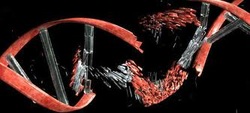
The most important protein for copying DNA also plays an essential role in mending damages, scientists from UC Davis have found. The research is helping scientists understand the formation of cancer cells and their resistance to chemotherapy and radiation.
The protein, called the proliferating cell nuclear antigen (PCNA), develops into a hoop that fits around the double helix of the DNA. This hoop helps keep in position the DNA polymerase, the enzyme which generates a copy of the DNA strand after cells split into a pair of new cells.
The study reveals that PCNA plays a similar role in DNA recombination – when chromosome pairs line up and switch DNA strands. Recombination happens when cells separate to form sperms or eggs, as well as when cells attempt to fix breaks across the two DNA strands.
“This is a new trick from an old horse”, stated Wolf-Dietrich Heyer, a microbiology professor at UC Davis and head of the molecular oncology programme at the UC Davis Cancer Centre.
The system that was developed for the experiment, using purified proteins and distinct DNA substrates, may also be used to study the behaviour of molecules involved in the copying and repairing of DNA, he said.
Heyer’s laboratory works mainly with yeast. He noted that while yeasts do not have cancer, their DNA system for recombination and repair is basically similar to that of humans.
Cancer drugs and radiation therapy both result in breaks in the DNA of cancer cells. If enough breaks are created, the cancer cell dies. However, the repair mechanism of the cell seals and patches the gaps.
The protein, called the proliferating cell nuclear antigen (PCNA), develops into a hoop that fits around the double helix of the DNA. This hoop helps keep in position the DNA polymerase, the enzyme which generates a copy of the DNA strand after cells split into a pair of new cells.
The study reveals that PCNA plays a similar role in DNA recombination – when chromosome pairs line up and switch DNA strands. Recombination happens when cells separate to form sperms or eggs, as well as when cells attempt to fix breaks across the two DNA strands.
“This is a new trick from an old horse”, stated Wolf-Dietrich Heyer, a microbiology professor at UC Davis and head of the molecular oncology programme at the UC Davis Cancer Centre.
The system that was developed for the experiment, using purified proteins and distinct DNA substrates, may also be used to study the behaviour of molecules involved in the copying and repairing of DNA, he said.
Heyer’s laboratory works mainly with yeast. He noted that while yeasts do not have cancer, their DNA system for recombination and repair is basically similar to that of humans.
Cancer drugs and radiation therapy both result in breaks in the DNA of cancer cells. If enough breaks are created, the cancer cell dies. However, the repair mechanism of the cell seals and patches the gaps.
 RSS Feed
RSS Feed